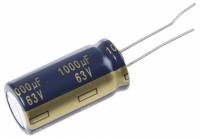Capacitors

Aluminium Electrolytic Capacitors
Life Expectancy
Technical notes for electrolytic capacitors
Jianghai - Reliability of electrolytic capacitors
Illinois Capacitor - Reliability
Reliability of CDE Aluminum Electrolytic Capacitors
ELNA - Reliability of Aluminum Electrolytic Capacitors
The life expectancy of aluminium electrolytic capacitors is related to their operating conditions, mainly temperature and voltage.
Usualy life expectancies are rated at maximum operating temperatures, i.e. the operation time by which the capacity has changed by 20-25% or the ESR (equivalent series resistance) has risen to twice the initial limit (200%).
As a rule of thumb, for every 10°C below the maximum rated temperature, the life expectancy can be doubled. However, due to less than perfect sealing materials, a maximum life expectency of 15 years is usualy the limit (about 130'000 hours) even in ideal operating conditions.
Example Life Expectancy Calculation:
Assume the following aluminium electrolytic capacitor:
Maximum operating temperature: 105°C
Rated life expectancy: 10'000h (@105°C)
At an actual operating temperature of 80°C we would operate 25°C below the maximum rated temperature and therefore more than quadruple its life expectancy. When expressing the rule of thumb as a formula we would get:
Actual life expectancy = Rated life expectancy * 2^((Max. operating temperature - Actual operating temperature)/10)
So we would get: 10'000h * 2^((105°C-85°C)/10) = 56'569h

